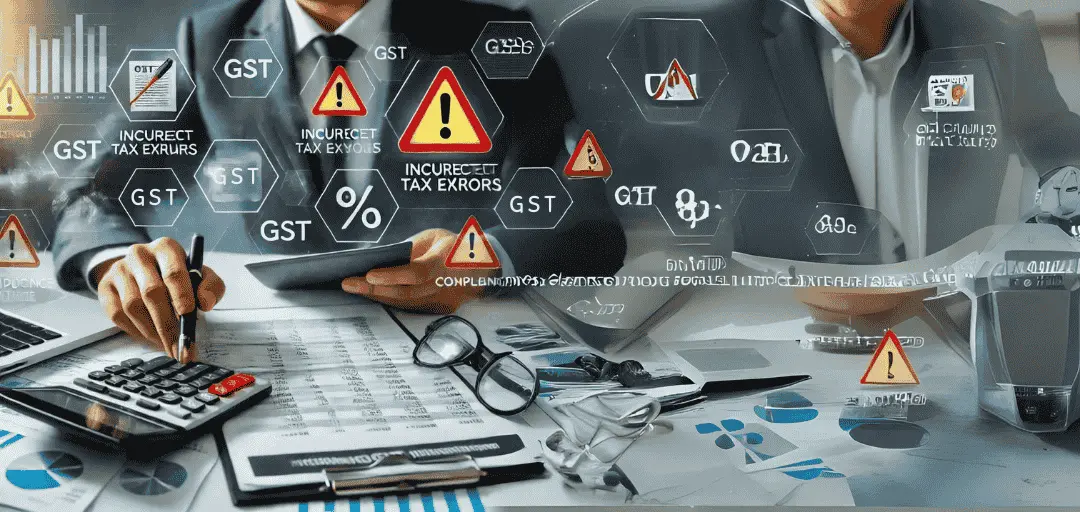Common GST Mistakes and How to Avoid Them
Goods and Services Tax (GST) has simplified the taxation system, but it also comes with complexities that can lead to GST errors if not handled correctly. Many businesses, especially small and medium enterprises, unknowingly make common GST mistakes that lead to penalties, legal troubles, and compliance issues. Understanding these mistakes and learning how to avoid them is crucial for smooth business operations. In this blog, we will discuss some of the most common GST errors and practical ways to prevent them.
1. Incorrect GST Registration
One of the most fundamental GST errors businesses make is incorrect GST registration. Many businesses either delay registration, register under the wrong category, or fail to update their registration details. This leads to compliance issues and unnecessary penalties.
How to Avoid:
- Ensure timely GST registration when your business crosses the threshold limit.
- Choose the correct category (Regular, Composition, or Exempted) based on your business operations.
- Update your GST registration details whenever there is a change in business structure.
2. Errors in GST Invoice Preparation
A valid GST invoice must contain specific details, including GSTIN, invoice number, taxable amount, tax rate, and HSN/SAC codes. Errors in invoicing, such as missing details or incorrect tax calculations, are among the most frequent GST errors businesses make.
How to Avoid:
- Use GST-compliant billing software to generate invoices.
- Double-check the tax rate, invoice number, and customer details before issuing an invoice.
- Ensure that all invoices are stored systematically for future reference and audits.
3. Incorrect GST Return Filing
Filing GST returns incorrectly is one of the most common GST errors that businesses commit. Errors in tax computation, incorrect data entry, or missing deadlines can lead to penalties and interest charges.
How to Avoid:
- Reconcile your sales and purchase data before filing returns.
- Use automated GST filing software to minimize manual errors.
- File your GST returns on time to avoid late fees and penalties.
4. Mistakes in Input Tax Credit (ITC) Claims
Incorrectly claiming Input Tax Credit (ITC) is a serious GST error that can lead to penalties or even rejection of the claim. Businesses often claim ITC for ineligible purchases or fail to match their ITC with supplier data.
How to Avoid:
- Cross-check ITC claims with supplier invoices and GST returns.
- Ensure that ITC is only claimed for business-related expenses.
- Regularly reconcile ITC details using the GSTR-2B statement.
5. Failure to Reverse ITC on Time
Businesses must reverse ITC in cases such as non-payment to suppliers within 180 days or utilizing credit for exempt supplies. Many companies overlook this requirement, leading to compliance GST errors.
How to Avoid:
- Track supplier payments and reverse ITC if payment is not made within the required timeframe.
- Maintain proper records of taxable and exempt supplies to calculate ITC reversal correctly.
6. Ignoring GST Payment Deadlines
Late payment of GST leads to interest charges and penalties. Many businesses miscalculate their tax liability or fail to set aside funds for timely tax payments, causing GST errors in financial planning.
How to Avoid:
- Set reminders for GST due dates to avoid late payments.
- Maintain a separate tax reserve fund to ensure timely GST payments.
- Regularly review tax calculations before making payments.
7. Errors in GST Refund Claims
Businesses eligible for GST refunds often make GST errors in refund applications, such as incorrect documentation, over-claiming, or missing deadlines, leading to delays in refund processing.
How to Avoid:
- Submit accurate and complete documentation while claiming refunds.
- Keep track of refund deadlines and file applications on time.
- Use GST refund calculators to ensure correct refund claims.
8. Non-Compliance with E-Way Bill Requirements
The e-way bill system is essential for tracking goods movement. Failing to generate, update, or carry an e-way bill during transportation results in GST errors that can lead to penalties and goods confiscation.
How to Avoid:
- Generate an e-way bill for all eligible transactions.
- Ensure proper documentation is carried during transportation.
- Keep track of e-way bill validity and update it if required.
9. Lack of GST Reconciliation
Many businesses fail to reconcile their GST returns with books of accounts, leading to GST errors such as mismatches between GSTR-1, GSTR-3B, and GSTR-2B.
How to Avoid:
- Conduct regular GST reconciliations to identify mismatches early.
- Use reconciliation software to automate the process.
- Resolve discrepancies before filing GST returns.
10. Misclassification of Goods and Services
Applying the wrong GST rate due to incorrect classification of goods or services is a frequent GST error that results in underpayment or overpayment of tax.
How to Avoid:
- Refer to the latest HSN and SAC codes for correct classification.
- Consult a GST expert if unsure about applicable tax rates.
- Update your accounting system with the correct tax categories.
Conclusion
Avoiding GST errors is crucial for maintaining compliance, reducing financial penalties, and ensuring smooth business operations. By staying updated with GST regulations, using automation tools, and conducting regular audits, businesses can minimize mistakes and stay compliant with GST laws. Implementing the preventive measures mentioned above will help businesses eliminate GST errors and maintain a hassle-free tax process.
Our GST Services

All E-commerce Tax services
E-commerce tax services help online sellers navigate GST registration, compliance, return filing, TCS management, tax planning, and audits, ensuring efficient tax management and legal compliance.

GST Filing
GST filing is the process of submitting tax returns to the government, detailing sales, purchases, and taxes paid or collected, ensuring compliance with GST laws.

GST Registration
GST registration is the process where businesses obtain a GSTIN from the government, allowing them to collect taxes, claim input tax credits, and comply with GST laws.





